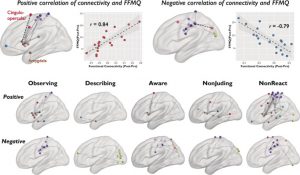Focused Meditation has Superior Effectiveness for Emotional Disorders
By John M. de Castro, Ph.D.
“meditation can help you relax and reduce stress. It can also help you disengage from stressful or anxious thoughts, and better control your mood.” – Healthline
Meditation training has been shown to improve health and well-being. It has also been found to be effective for a large array of medical and psychiatric conditions, either stand-alone or in combination with more traditional therapies. As a result, meditation training has been called the third wave of therapies. One problem with understanding meditation effects is that there are, a wide variety of meditation techniques and it is not known which work best for affecting different psychological areas.
There are a number of different types of meditation. Classically they’ve been characterized on a continuum with the degree and type of attentional focus. In focused attention meditation, the individual practices paying attention to a single meditation object, often the breath. In open monitoring meditation, the individual opens up awareness to everything that’s being experienced including thoughts regardless of its origin. Mindfulness-Based Cognitive Therapy (MBCT) employs both focused and open monitoring meditation and also Cognitive Behavioral Therapy (CBT). During therapy the patient is trained to investigate and alter aberrant thought patterns. It is important to understand which form of meditation training works best for which conditions.
In today’s Research News article “The contributions of focused attention and open monitoring in mindfulness-based cognitive therapy for affective disturbances: A 3-armed randomized dismantling trial.” (See summary below or view the full text of the study at: https://www.ncbi.nlm.nih.gov/pmc/articles/PMC7802967/ ) Cullen and colleagues recruited adults with mild-moderate depression and anxiety and randomly assigned them to an 8-week program of one of three meditation types; focused meditation, open monitoring meditation, or their combination as occurs in Mindfulness-Based Cognitive Therapy (MBCT). They were measured before training and weekly over the 8-week program and 12 weeks later for depression, stress, and anxiety.
They found that all three meditation programs produced significant improvements in depression, stress, and anxiety at the end of training and 12 weeks later. But Mindfulness-Based Cognitive Therapy (MBCT) and focused meditation produced significantly greater reductions in anxiety at the 12-week follow-up than open monitoring meditation. During training statistically significant improvements in depression, stress, and anxiety occurred first for focused meditation, followed by MBCT, and last by open monitoring meditation.
These are interesting results that again demonstrate the efficacy of meditation training in improving depression, stress, and anxiety. They also found that the training in both focused and open monitoring meditation as occurs in Mindfulness-Based Cognitive Therapy (MBCT) did not produce superior results to the individual meditation types. Finally, they show the focused meditation may be superior to open monitoring meditation in relieving depression, stress, and anxiety. The participants who practiced focused meditation improved faster and at follow up had lower levels of anxiety than those who practiced open monitoring meditation.
The reason for the differences in the effectiveness of the different meditation types is unknown. But focused meditation may be simpler and easier to learn and practice than open monitoring meditation. Also, open monitoring meditation by having the practitioner open up awareness to everything that’s being experienced may allow for anxiety, stress, and depression to more easily arise during the session. Future research should investigate these possibilities.
So, focused meditation has superior effectiveness for emotional disorders.
“Within just a week or two of regular meditation, you should see a noticeable change in your mood and stress level. “People will start to feel some inner peace and inner poise, even in the midst of their busy lives,” – Burke Lennihan.
CMCS – Center for Mindfulness and Contemplative Studies
This and other Contemplative Studies posts are also available on Google+ https://plus.google.com/106784388191201299496/posts and on Twitter @MindfulResearch
Study Summary
Cullen, B., Eichel, K., Lindahl, J. R., Rahrig, H., Kini, N., Flahive, J., & Britton, W. B. (2021). The contributions of focused attention and open monitoring in mindfulness-based cognitive therapy for affective disturbances: A 3-armed randomized dismantling trial. PloS one, 16(1), e0244838. https://doi.org/10.1371/journal.pone.0244838
Abstract
Objective
Mindfulness-based cognitive therapy (MBCT) includes a combination of focused attention (FA) and open monitoring (OM) meditation practices. The aim of this study was to assess both short- and long-term between- and within-group differences in affective disturbance among FA, OM and their combination (MBCT) in the context of a randomized controlled trial.
Method
One hundred and four participants with mild to severe depression and anxiety were randomized into one of three 8-week interventions: MBCT (n = 32), FA (n = 36) and OM (n = 36). Outcome measures included the Inventory of Depressive Symptomatology (IDS), and the Depression Anxiety Stress Scales (DASS). Mixed effects regression models were used to assess differential treatment effects during treatment, post-treatment (8 weeks) and long-term (20 weeks). The Reliable Change Index (RCI) was used to translate statistical findings into clinically meaningful improvements or deteriorations.
Results
All treatments demonstrated medium to large improvements (ds = 0.42–1.65) for almost all outcomes. While all treatments were largely comparable in their effects at post-treatment (week 8), the treatments showed meaningful differences in rapidity of response and pattern of deteriorations. FA showed the fastest rate of improvement and the fewest deteriorations on stress, anxiety and depression during treatment, but a loss of treatment-related gains and lasting deteriorations in depression at week 20. OM showed the slowest rate of improvement and lost treatment-related gains for anxiety, resulting in higher anxiety in OM at week 20 than MBCT (d = 0.40) and FA (d = 0.36), though these differences did not reach statistical significance after correcting for multiple comparisons (p’s = .06). MBCT and OM showed deteriorations in stress, anxiety and depression at multiple timepoints during treatment, with lasting deteriorations in stress and depression. MBCT showed the most favorable pattern for long-term treatment of depression.
Conclusions
FA, OM and MBCT show different patterns of response for different dimensions of affective disturbance.
https://www.ncbi.nlm.nih.gov/pmc/articles/PMC7802967/









